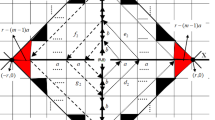Abstract
The target is moving in a discrete space, consisting of cells, according to so called conditionally deterministic law with stochastic parameters. A necessary condition for search density to be optimal is determined by using control theory in the cases when a) probability of detection during given time is to be maximized and b) expected search time is to be minimized. The results obtained are applicable also in the cases where the conditional non-detection function is not convex.
Similar content being viewed by others
References
R. Gabasov andF. M. Kirillova,Principi maksimuma v teorii optimal'novo upravleniya, Izd. Nauka i Tekhnika, Minsk, 1974.
U. Pursiheimo,Optimal search for a target whose motion is conditionally deterministic, with stochastic parameters; a continuous time, discrete space model, Rep. No. 61, Institute for Applied Mathematics, University of Turku (1974).
Author information
Authors and Affiliations
Additional information
Communicated by A. V. Balakrishnan
Rights and permissions
About this article
Cite this article
Pursiheimo, U. A control theory approach in the theory of search when the motion of the target is conditionally deterministic with stochastic parameters. Appl Math Optim 2, 259–264 (1975). https://doi.org/10.1007/BF01464271
Received:
Issue Date:
DOI: https://doi.org/10.1007/BF01464271




